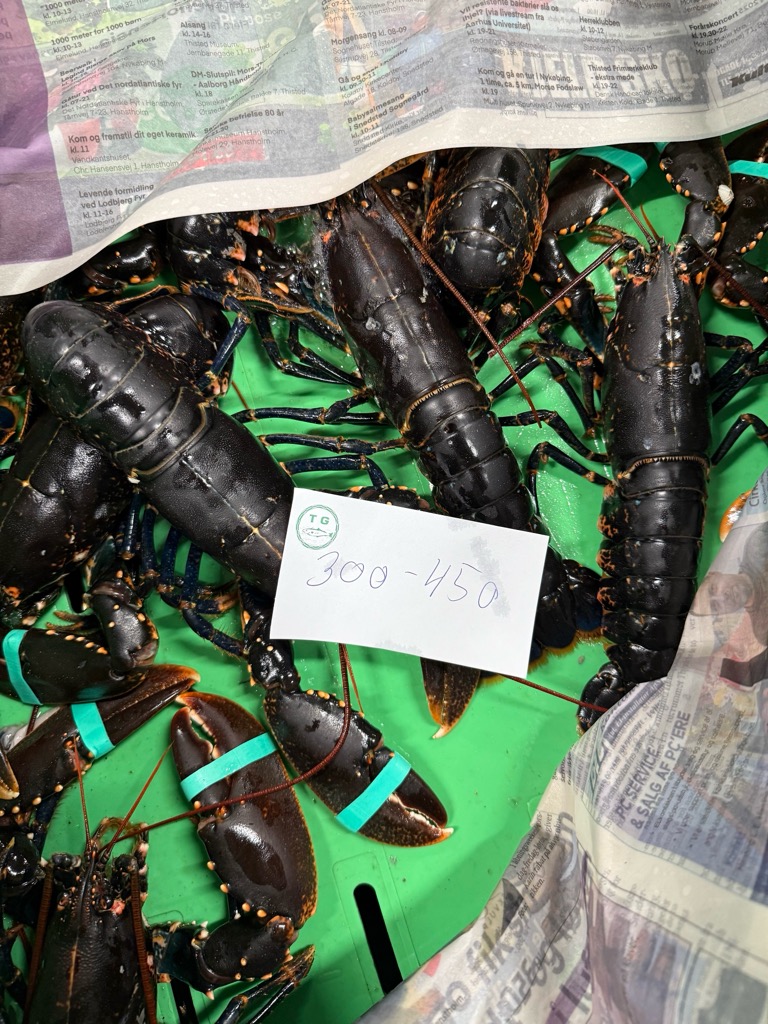Squid are moving closer to Denmark – and that means both treats and trouble!

More Squid in Danish Waters
It is a fact that more and more squid are coming into Danish waters. And that’s a good thing. We already know well the ten-armed squids, which we’ve had for a long time and which are already being fished. In fact, there are three different species that we see more often at the auctions. These are Loligo forbesi, Loligo vulgaris, and the “flying squid” Todarodes sagittatus—all of which are quite similar to one another.
But in recent years, we have also seen the Illex squid, which has thinner flesh and doesn’t have the same culinary quality as the others. At the auctions, it’s simple: they are just called “squid.” And if you ask which kind it is, then it’s either the right one—or the wrong one. And the wrong one is Illex.
Besides these, there are at least ten other species living in Denmark that we don’t really see at the auctions. Either because they simply aren’t caught by the fishermen, because they are too small, or because they would have to be caught with gear that Danish fishermen don’t (yet!) use.
One of those species is the eight-armed European octopus, Octopus vulgaris, which we took a closer look at in the July issue of Fiskerikajen Update. That octopus is currently causing major problems along the southern English coasts. The problem is that there are an extreme number of them this year, and that creates issues for English lobster fishermen, who are finding their pots emptied by octopuses—leaving behind only the empty lobster shells.
Octopuses are intelligent animals, and once they figure out how easy it is to empty lobster pots, well… they keep at it. Unfortunately, they also eat all the smaller lobsters, as well as scallops, crabs, and other animals that normally belong along the English coasts. For the fishermen, the problem is not much more than the fact that this year they’ve landed large amounts of octopus instead of lobster and crabs. But for the ecosystem, it’s extremely challenging when a species that normally isn’t so numerous suddenly explodes in population.
Lobsters and crabs, unlike octopuses, take many years to reach spawning maturity, so one can almost certainly expect fewer lobsters and crabs in the coming years.

Hopefully, this is not a situation that will continue for long—and in fact, there’s a good chance it won’t. One of the things we mentioned about the eight-armed octopus back in July is that they are extremely short-lived. They only live 1–2 years, which means the population can fluctuate enormously from year to year.
Life beneath the surface is changing as temperatures rise
Still, it’s a vivid reminder that the world beneath the surface is changing as temperatures rise, and it’s by no means unthinkable that we’ll see many eight-armed octopuses in Danish waters in just a few years.
Until then, we’re happy to have the ten-armed squids. And the more of them that come, the greater the chances that they’ll be caught sustainably. We won’t be buying trawled squid—but we will buy every single one that’s been caught gently.
And when we don’t have them, we still have the truly beautiful line-caught squid from Morocco and Spain, just as we always have. And those you can dive into with confidence!
Want to know more?
Contact us to get set up with with the season’s best fish and shellfish.

Podcast: Fiskerikajen Update
You can also catch our regular seasonal updates as a podcast.Listen here

